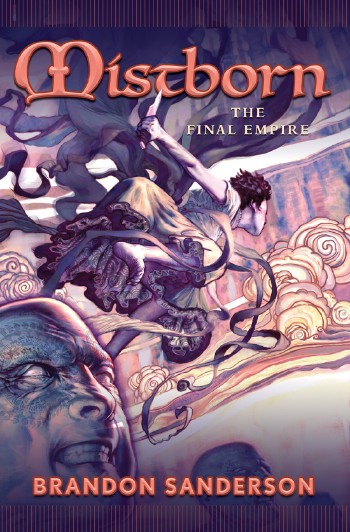
Sanderson puts an impressive new coat of paint on your typical tale about saving the world. Sometimes he even hints at subversion or deviation. Then again, I must be just a hopeful person dying for a good story. They’re not hard to find, and I constantly find seeds of them in bad or decent stories. At some point, though, I worry that I might be just digging to deep hoping to find dinosaur bones in shallow grounds.
The book isn’t bad, but it’s hard to reconcile the unique backdrop with its horribly ordinary structure. If you’ve seen Star Wars, you know how the story goes. A mentor meets a complete nobody. He helps that nobody discover their hidden powers and it turns out this nobody was actually way more powerful than the rest. A crew of good-natured rebels do some jobs all building up to the revolution that’s only missing some Rage Against the Machine
Mistborn is as cookie-cutter as you can get, yet it’s fun. It avoids nearly every bad trope of fantasy. While not injecting anything too subversive, Sanderson writes with enough energy. By trimming the fat, he managed to write a fun fantasy romp that despite stretching to 600 pages never actually loses steam.
Praising a book for what it doesn’t have feels weird. A good book should be defined by what it makes special. I can praise Sanderson for not writing in a bloated way, for not relying so much on worldbuilding but does that sound tempting? Great works don’t earn their position because they weren’t bad, but because they’re good in a unique way. Bad books fail in many departments. Good books are successful in a very specific thing.
Sanderson’s strength isn’t special, but it’s a rarity in modern fantasy. Despite being praised for worldbuilding and a ‘developed magic system’, the novel doesn’t actually rely on these. The magic system only adds some flash to the combat scenes and the worldbuilding is focused on concepts, not details.
His worldbuilding is strange. The commonly praised method of worldbuilding in fantasy is horrible. We’ve seen in that popular disaster by George R. R. Martin. Pile a lot of details, and all you do is bore the audience. Just because a detail exists doesn’t mean it’s important. Even non-fiction books which should be about facts choose which to present. What was Stalin’s preferred method of eating potatoes is most likely irrelevant in a general history of USSR.
So Sanderson avoids piling on these details. He mentions that a lot of great houses exist, but he never provides of a list of them. He drops some names only to show they exist, but the story is focused around one or two or three. This deliberate refusal keeps the reader’s mind on the story, rather than memorizing all the great houses. Imagine how more energetic Game of Thrones would’ve been if Martin trimmed his fat.
He uses this technique often. Names of cities and of people appear, but they always exist only to inform the reader that the world is big. Sanderson avoids writing an entire encyclopedia of his world in the novel. In the end, you will only know the basics about Luthendel, where the Terrisman live and that’s it. By teasing the reader about the parts that aren’t too relevant to the story, Sanderson makes his world feel actually big and makes you wonder what other stories can take place.
As for his magic system, it’s definitely meant for an RPG game rather than a novel. Sanderson is always on the brink of telling you how much mana points the magicians have left. His deviation don’t mean much, since they’re never explored conceptually. The magic is biological in nature, which makes for an inaccessible class of wizards. We see a little of how their culture exists, but not enough. Changing it from mana to consumed metal is a cool aesthetic and it does affect the world’s relationship with metal, but again we don’t see it enough. In a world where metal is both a source of strength and a weak point for a powerful class, how does it affect people’s view of metal and their relationship with it? Mistings aren’t obscure. Metals are integral to humanity, so integral we don’t question out relationship.
At least his system isn’t overly complex. As a way to dress up action scenes and make them more fun, it’s good. The brevity is integral to the action scenes. They consist of set-pieces that connect instead of a blow-by-blow account that’s hard to follow unless you’re a WWE fanatic. He mines the technique of pulling and pushing steel objects for some cool scenes, but they display the weakness of action scenes in novels. Action gains its strength from the visual. Seeing a person getting hit is more affecting than reading “A fist hit a person”. While there’s thrill to hear about a tornado of metal objects, it sounds more like the cure for Hollywood’s sorry state of action movies.
What Sanderson does get right – and what’s pretty confusing – is his characters. There are some archetypes, but they’re distinct. One of the most arresting scenes is between Elend and Vin-as-Valette, and that’s solely because each has subtle speech patterns. The dialogues are engrossing because they feel so real. Breeze and Ham and Kelsier may not be deep, but even the dialogue between Breeze and Kelsier is different. Both are arrogant, but Sanderson lets snobbishness into Breeze’s speech whereas Kelsier talks like he believes himself to be a rock star.
This is why the book works, despite not containing anything extraordinary. It avoids all the flaws of a typical Fantasy novel, but its live characters make its adventure fun. How similar the structure to Star Wars is irrelevant when the characters are completely different but the novel has that same focused narrative. Mistborn isn’t amazing, but it’s something we need – a Fantasy story about saving the world with entertaining characters that’s actually fun.
2.5 mistings out of 5

Thank you! Love Brandon Sanderson! I actually did not enjoy his books at first, but I’d find myself at work wondering what happened to characters to the point where I annoyed myself; finished The Way of Kings and inhaled all his other books after that.
Love the GoT story, hate the style it’s written in.
LikeLike
I find Sanderson to be a dude with good ideas, but overall awful execution.
He can come up with good images. I love his world, not for the amount of details he has but the emphasis on atmosphere and meaning. His world isn’t driven by an abundance of details – like Martin’s – but images that spark emotions.
Sadly, his numb prose and mechanical plot let him down.
Thanks for your comment.
LikeLike
I agree with the prose statement. The final battle scene of Oathbringer however had me standing up and reading it it was so good.
Looking for something good to read at the momen. Any suggestions?
LikeLike
Fantasy? I don’t enjoy Tolkien’s influence, so I’d go with Dunsany’s King of Elfland’s Daughter.
It’s what Fantasy should look like, actually fantastical and weird and magical. None of that false sense of control Sanderson, Martin and Tolkien love. I should post my review of it.
LikeLike